#fable theory
Text
Wild theory just hang on with me for a minute :
Fable already killed Ven once.
Think about it :
1. Ven is the same age as he was when he conveniently dropped off the face of the earth and STILL has no memories of the time between the war and his sudden appearance in s2.
2. Wolf at least has an explanation why he's younger than he should be (was dog). And everyone else clearly aged normally during the resets (Athena aged normally for their species and the World sisters don't age). So what happened to Ven?
3. The last correspondence we have from Ven clearly states that his life is in danger, that Fable is going to kill them very very soon.
4. Fable has revived Icarus many, many times using "As It Is."
Theory: Fable killed Ven a long time ago, and revived him like he did Icarus. Thanks to Ven's memory issues, they wouldn't remember their death and would thus still be loyal and incredibly helpful for when Fable got out (which he intended to do that reset.)
I think he'd have zero qualms about doing it again, too, if he wasn't already desperate for allies. Maybe he still will if he's enough of an idiot (he is).
#fable smp#fsmp#fsmpblr#c!ven fable#fable theory#brain went brr on Sunday and I just remembered it now
74 notes
·
View notes
Note
please explain to me your theory about the spire exploding!! I’m interested :)
Ok! Thanks!
So, the Spire was built to harness all the Will energy in the world, using it to grant wishes, right?
Will energy is generated by all living beings. And it has something in common with the force of DETERMINATION from UnderTale.
DETERMINATION is produced when a person is feeling particularly determined.
Will is similar. The amount of Will gathered at one spot in the world opened a rift between the Void and the world, which the Corruption slipped through.
The three Heroes who sacrificed themselves to seal it willed it so, that their sacrifice would provide what was needed to seal it.
They, in their final moments, produced an enormous spike in Will energy, as they willed with their very lives that the Corruption be sealed. Which happened at around the same time as when the Last Archon made his wish.
The Spire, in my theory, functions by maintaining a field or gathering of Will energy. It uses this to grant wishes. The Spire can only work when this field is stabilized, however. It’s very much like spinning a plate on a pole. The moment it destabilizes, if nothing is done to counter, everything comes crashing down.
The large spike in Will produced by the three Heroes destabilized the balance the Spire was maintaining, as it sought to do what it was built to; draw Will energy to itself.
The pull the Spire exerted in an attempt to draw the new Will energy to it either put ‘pressure’ on or otherwise moved/compressed/jostled the Will it already had.
This destabilization happened, essentially at the time that the Archon’s wish was either being processed or was in the process of being granted.
The Will energy turned volatile, and when the Spire could not contain the Will or re-stabilize it, it erupted outward in a wave that leveled the civilization.
This very much depends on my own understanding of energy, and how energy becoming destabilized can affect things. Mostly science, and some sci fi.
What do you think?
6 notes
·
View notes
Text
There's a story of questionable veracity about Harry Houdini performing an escape in which his wife passes him a key with a kiss.
I keep thinking about this story when I think about the kiss Crowley and Aziraphale share.
For me, it comes down to this: the fight between them is real. It has to be, because handwaving such an emotional scene as "for show" would be deeply unsatisfying. On top of that, it's consistent with the flawed beliefs that each of them carry. Crowley wants to run away to the stars, Aziraphale wants to Speak to the Manager about Heaven. There's no reason to think the scene is a lie, because if they were both telling the truth, that's what it would look like.
And yet. In a season that's all about misdirection and performance, I can't help but think there's something more going on. I haven't been fully convinced by any theory I've come across yet, including my own, but I do think there's an undeniable sense of waiting, of watching for the twist.
If the fight was real then where is the performance? Could the kiss have been real, and still misdirection? It's all an appeal, Crowley begging Aziraphale to stay, but maybe it's something else too. Maybe it's, stay, please stay, but if you won't, at least hold onto a way back to me. I'm not gonna pretend I know anything for sure. I just keep thinking about Houdini's wife kissing him, and slipping him a key.
As for what Crowley might have given Aziraphale, all I have is speculation. I've thought about this a lot and I can't come up with anything obvious placed earlier in the story that might help. But if I were going to guess? I'd say Crowley gave him the same thing he asked Aziraphale for back in 1862.
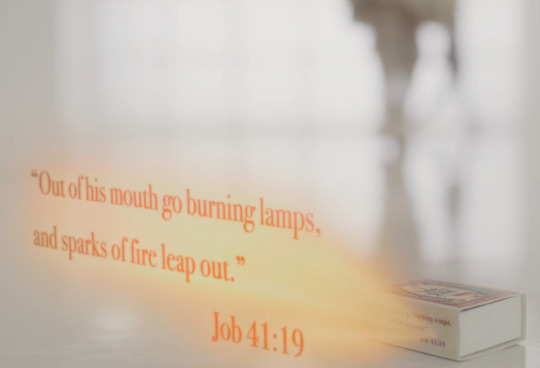
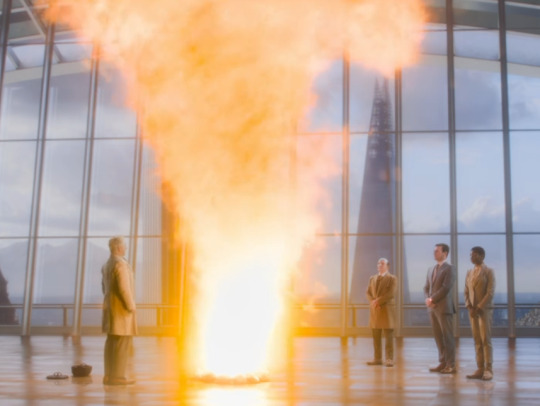
Insurance.
2K notes
·
View notes
Text
Thinking about how Fable smp was about the history and aftermath of a war and it wasn't until Fable came back it became a battlefield again
#like yeah the war was technically not over but sure as hell could have stopped their#fable smp#fablesmpblr#fable smp headcanon#fable smp theory
116 notes
·
View notes
Text
maybe Fable never actually cared about bringing people back to life. at least not in any emotional way. He created humans. it's his fault they're mortal. the Aether was a safe haven for the departed souls to go to. but it was away from the overworld, and away from Fable's domain. it was never about grief. maybe it was always just a need for control
#and then fable did all these terrible things to make up for something he perceived as a mistake#and is now too far down the villain route to move on from it#like son like father if you know what i mean#fable smp#fsmp#fable smp fable#fable smp theory#fsmpblr#glass.txt
81 notes
·
View notes
Text
What if the wack is Icarus, not Quixis
Hear me out:
When Icarus burned the Ominous banners, it reminded them of Ominous bane, making the banners appear.
When they apologized to Rae, orchids appeared, the symbol of their connection.
Icarus can’t do what Fable does because they don’t have control of their powers.
In Sherb’s CMV “gold”, Quixis takes their hands away from the colorful wall and suddenly Icarus falls out of the sky with their wings changing.
I think Quixis is holding back Icarus’s powers until they figure out how to use them properly and/or so Fable can’t weaponize Icarus or so they don’t hurt themselves. (Maybe because that’s what Quixis wished someone did for them)
#should I be given access to Tumblr late at night?#the answer: no#fable smp#fsmp theory#fsmpblr#icarus morningstar#quixis#this has been floating around my head for SO long
59 notes
·
View notes
Text
Over the Garden Wall is SUCH a fascinating show to me for a myriad of reasons. But one of the things that stuck with me was the symbolism of the Woodsman and his lantern. TW for discussions on grief and unhealthy coping mechanisms (that I might get wrong, just as a warning).
I'm sure this has been said before, but to me it's just such a fascinating representation of how we unintentionally keep despair alive by clinging to our overwhelming grief of those we lost. Maybe I'm misinterpreting something or looking too deeply into it, but it's just. The lantern that the Woodsman keeps lighting in the hopes that his daughter's soul will be kept alive through it is, in actuality, keeping the Beast alive. And in a similar way I've read tales and actually studied grief theories about how people keep the memory of their loved one alive; at first, it's a good thing, and it can take however long or short you need to it be since grief seems to be something that generally never really goes away.
But there can come a point where all you live for is the dead, which is what the Woodsman was doing in laboring day and night to keep the lantern alive. And in doing so, you start to poison yourself and, rather than keeping the person you lost in living memory, you start to keep alive the despair and darkness. You start to keep alive the Beast rather than the soul of your daughter, in other words. Sometimes, it's intentional, though. "If I let go of this despair and anguish of mine, doesn't that mean I'll forever lose that person I loved?" And sometimes, it's unintentional.
The conclusion of it is that you have to let them go...you have to let that despair (not grief, but the poisonous and hopeless grief) go. Maybe, like Wirt did, through unflinching practicality and sheer knowledge rather than emotion. Or something else. But maybe, then, you'll find that when the lantern of your despair is gone, it'll be dark at first but you'll slowly start to see a grander light. And maybe, you'll find that your daughter is still alive anyway, in the light rather than in the darkness.
#i really am sorry if i misinterpreted something or that my thoughts on grief and despair and their difference lacks nuance#i still haven't really ever experienced a personal loss#and studying about grief theory and such things can only get you so far so feel free to add on? XD#otgw#lemon duck quacks#over the garden wall#also yes this is part of me blatantly theologizing a media#(shoutout to a certain mutual who enthusiastically told me about otgw and got me curious enough to watch it)#it is such an autumn aesthetic show with such....folktale and fable energy
147 notes
·
View notes
Text
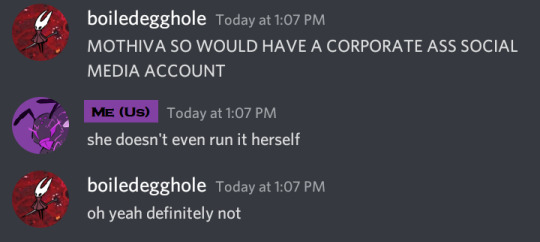
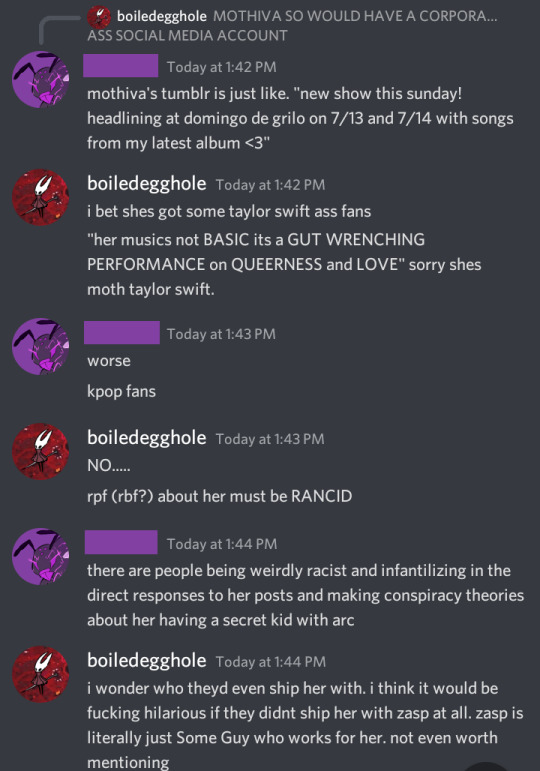
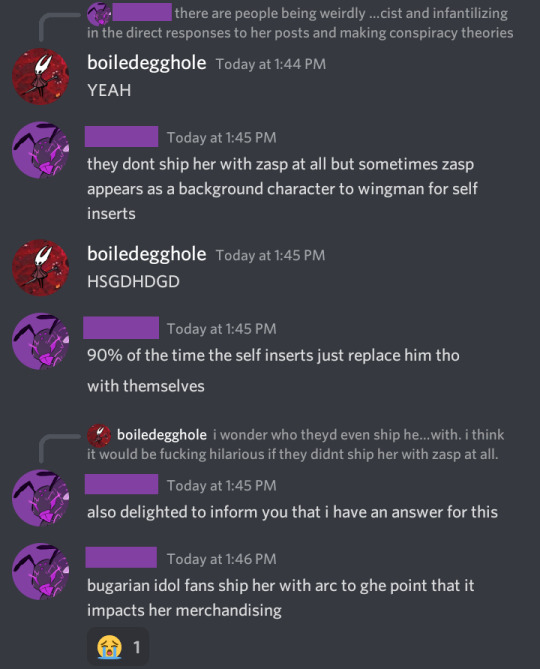
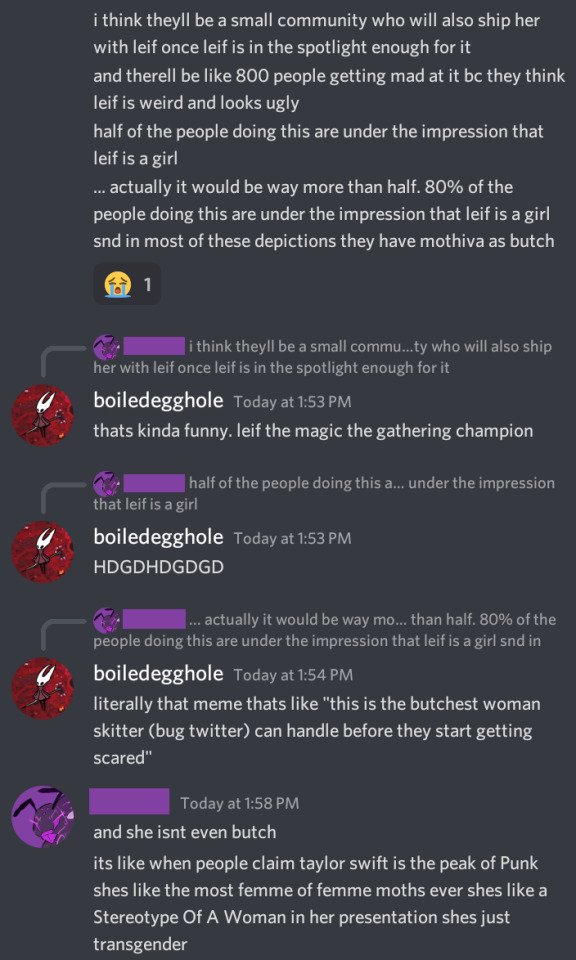
#we speak#bug fables#vital discord brainstorming with boiledegghole and also a small snip of someone who doesn't run this blog in theory#and has been sneaking posts in in practice#normal idol fandom stuff
62 notes
·
View notes
Text
i have been thinking about god's motives recently, because we still don't have any concrete motive about why someone would want to kill Alerion, his death was so hazy, and Enderian- the one who had Alerion's powers, who had to have acquired them somehow- Enderian has no motive that i can think of, not any that we've heard about at least.
Netherum had no motive either, especially since if i remember right Athena was created before Alerion's fall, so why would they risk their new child, wife, and realm? what would be strong enough to discard their life?
Fable though; Fable who everyone is aligned against, all of the gods on any side that isnt his,
and maybe Enderion's hatred of him was just for blaming her for Alerion's death- or later, how he treated isla, not having told her about his godhood status, or it could have been he killed Alerion, somehow
because Fable is the only one who has a motive, its been revealing itself more and more now that hes been opening up more
hes scared of the mortals around him dying, he was scared of his kingdom dying, and after the war started, hes scared of his family dying. and Alerion was the one who watched over them when they did
and so maybe he thought- or hoped, that even if the mortals couldnt be alive again, they could roam, still be people like how they were in the aether, if the aether fell
and thats even more suggested in the fact he killed aphrien and achrien to free the souls in the fall of the aether, another attempt to get mortals to still roam
(the question on why they wouldve stopped the souls is another interesting question, or, why they would've stopped fable)
and the fact is- Cece was the only one we know about that actually got out, and that was due to reset and time shenanigans, not of fable's 'help'
so fable does have the most clear motive- to stop death, stop the mortals he cared for from dying, or do the next closest thing
#im speculating!!#but the peices are putting themselves together#and maybe its not quite the right puzzle- but it's still fun to put them together#fable smp#fable smp theory#fin speaks
42 notes
·
View notes
Text
holy shit more ramble
i remembered rae almost told icarus that centross is a god
rea is slowly looking more like epros and he was called void prince (shout out to the random tumblr post that pointed that out) now for my brain to add to it rea is and always has been the prince of the end after all his mother was the queen. but since enderian is gone. rae is now technically the king of the end... all icarus has is two dead kingdoms (that's a skill issue if you ask me)
rea got lucky he had his signal reader on him or icarus would've known of it
did i mentioned how much i love the tail last time? cause i love it. it's great. and just so nice and aaaaaaaaa
with the brothers being absolute dust i worry for both of them. icarus doesn't care about any deaths cause he thinks it's gonna all be "fixed"
the only way my brain can think of to "fix" anything would be a reset cause technically momboo would be back then. since kai has died before (i think)
i think rea may become a god or like demigod-ish. cause end things. but also then wolf would have three protective god boyfriends all having ties to the end.
#fable smp#icarus morningstar#rae morningstar#fenris#wolf#fable#kai#TAIL#momboo#fable smp momboo#end#gods#theories
30 notes
·
View notes
Text
I think that the Snakemouth roaches had a leaf of the Everlasting Sapling, but Spuder ate it.
- It explains why Spuder has been around since Queen Elizant 1 times
- The first and last chapter bosses would have both eaten the Sapling, which is nice bookends
- It's really funny
The problem with this theory is that Spuder is not covered in leaves like the Everlasting King. I'll fix that tomorrow, but right now it's really late.
#the scientists were kinda terrified of Spuder after he ate the leaf#there was a period where they tried to capture Spuder to study#but alas they failed#bug fables spoilers#bug fables#spuder#theory#headcanon
34 notes
·
View notes
Text
Philosophy With Disco: The Importance of Death in a World with Immortality (And Subsequently Why Fable is an Idiot)
On Fable SMP, Fable is on the warpath in a grief-driven, mad attempt to usurp the primordials and end death forever. This is single-handedly the worst thing he could do for himself, the other gods, and the world as a whole, and it all comes down to how the finite nature of death is vital in a world with immortality. This is a long one, so get comfy.
Immortality is a curse. To us mortals, it seems like the most amazing thing ever, but when you actually stop and think about it, immortality is a miserable existence. There are no stakes. Unless you are killed, you will live forever. Anything you create will rot and fall apart, so you won’t be able to enjoy it forever. There’s only so many skills you can develop in an eternity. Boredom is inevitable. Eternity stretches on forever. There are no deadlines, no concrete timeline. Every day is the same, weeks pass without noticing, centuries drift by as easily as a leaf in the wind, because there’s nothing to hold on to. Nothing will last except for you, the immortal, a constant presence in an ever shifting landscape, a pointless permanence.
You see, in a world where there are beings who live forever, the introduction of beings who don’t live forever is crucial. An immortal needs someone else to focus on, something fleeting and temporary and interactable to take their focus off their own impending eternity, something to give life meaning. Mortals live for such a short time, a blink of an eye for an immortal, yet they live and love and laugh and cry and then they’re gone. Caring for mortals and assisting them is the most fulfilling thing an immortal can do.
The immortal won’t be able to enjoy art for eternity, but several generations of mortals will. The immortal doesn’t need food or water to sustain themself, but mortals rely on it. The powers of an immortal don’t seem like anything spectacular, but to mortals they’re an awe-inspiring, terrifying force worthy of respect.
To mortals, an immortal force brings help in trouble and feelings of safety, protection, and a reason to come together in communities. To immortals, mortal life brings meaning, urgency, and a tangible timeline to disrupt the mind-numbing monotony of eternity. They are mutually beneficial.
The most common trap that gods fall into is the trap of thinking of mortal beings as “lesser,” but that couldn’t be further from the truth. To immortals, mortal beings are the most important thing in existence. In fact, it's safe to say that immortals need mortals more than those mortals need them. Interestingly, Fable has the opposite problem. Fable absolutely adores the mortals he created with every fiber of his being. But that love blinded him, and he lost sight of the reason mortals are necessary to begin with. His love turned obsessive, similarly to Perix but infinitely more destructive, as his desperate drive to save the mortals he loves from their inevitable fates upends the system that kept the immortal world stable to begin with.
At least, that’s my thoughts, and I’d love to hear what others have to say about it. :)
#fable smp#fsmp#fsmpblr#fable theory#I'm a nerd for philsophy I'm sorry#I really just wrote an essay on the importance of death in a minecraft roleplay server#what is my life#anyway thank you for coming to my TED talk
34 notes
·
View notes
Text
More fable smp theories bc I'm totally and completely normal about it!
I'm once again not caught up (I just watched sherbs vod for "like King, like prince") but I have thoughts about the Isla painting in Fables tower.
Remember how he took Isla? Remember how he didn't tell any of the coworkers? I dont think he knows that anyone but him knows that he took her... Anyway, he has to be hiding her somewhere. Do you see where I'm going with this. What if he just went "time to hide you in a painting :)"? Literally hiding her in plain sight? Bc I don't doubt that that's a thing he's capable of doing. It'd make sense for him to just do that.
I'm also pretty sure Rae told him that he found a portrait of Isla which means that it isn't far fetched for Rae to think that Fable just found the painting again and put it in his tower. Also, I think she's still cursed right? So it'd make sense for Fable to just put her somewhere until the war is over and he can deal with the curse (if he does at all).
Anyway, yes, that's my ramblings lol, thank you for reading and have a nice day ^^
#fablesmpblr#fable smp theory#fable smp#fable smp fable#fable smp isla#fable smp icarus#how does one tag#i hope this makes sense
20 notes
·
View notes
Text
A dash of nutmeg...
Look I feel a bit like I'm throwing soup at a dart board and calling it analysis, but I have some thoughts about Aziraphale's magic words in episode 4, and it's going to kill me if I don't share.
The thing is, these words have been nagging at me since I heard them. They sounded familiar, and I've been trying to figure out why. Today, it finally clicked.
Banana. Fish. Gorilla.
Those initial three words are all key words from Crowley and Aziraphale's drunken conversation about Armageddon. It's right at the start of things, when Crowley convinces Aziraphale to help him stop the world from ending.
We'll start with the fish, because they come up first.
"The point I'm trying to make," [Crowley] said, brightening, "is the dolphins. That's my point."
"Kind of fish," said Aziraphale.
Their entire exchange here is hilarious and iconic but I'll try to keep this to the point. After some banter about the difference between fish and mammals, Crowley argues that dolphins don't deserve to be caught in the crossfire when the kraken rises and the seas boil. Which conveniently brings us to:
"Same with gorillas. Whoops, they say, sky gone all red, stars
crashing to ground, what they putting in the bananas these days?"
Banana. Fish. Gorilla. It got me curious, so I searched for other places these words show up in the book. There's nothing I think is really significant: a couple of things are described as banana flavoured, fish show up in rains that herald the impending doomsday, gorillas aren't ever mentioned again. If I'm on the right track at all, I think this part is here to signpost a connection between this string of words from the show and the specific moments in the book.
If that's true, it must be pointing to something. What's left? Shoe lace and nutmeg.
Shoe lace.
The word "shoelace" isn't actually in Good Omens. Neither is "shoe lace" with a space in between. There's a couple of unremarkable descriptions involving shoes, and one miraculously conjured lace handkerchief, and then - and then. Right at the very end of the story, we have Adam, grounded by his parents, being described as "a scruffy Napoleon with his laces trailing, exiled to a rose-trellissed Elba". It's tenuous. I could dismiss that as nothing. Except Adam's laces show up again, and it's the very last passage of the book.
If you want to imagine the future, imagine a boy and his dog and his friends. And a summer that never ends.
And if you want to imagine the future, imagine a boot . . . no, imagine a sneaker, laces trailing, kicking a pebble; imagine a stick, to poke at interesting things, and throw for a dog that may or may not decide to retrieve it; imagine a tuneless whistle, pounding some luckless popular song into insensibility; imagine a figure, half angel, half devil, all human . . .
Slouching hopefully towards Tadfield . . .
. . . forever.
I'm not ready to say much about what I think the significance of this passage might be. But an allusion to the book's ending does feel significant, doesn't it?
The one thing I will say, for people who may not know, is that this passage is riffing on a line from Orwell's 1984. The line it's playing on is a lot darker: "If you want a picture of the future, imagine a boot stamping on a human face – for ever." I think it's probably relevant that this is referencing a book about a totalitarian regime. I also think it's probably relevant that it's taking that reference and twisting it into something much sweeter, more optimistic and empowered.
I'm still thinking through all the connections and implications, though.
Nutmeg.
And that brings us to "nutmeg". I have to be honest, I wasn't hopeful. I didn't remember any references to it and if I were betting, I wouldn't have put money on it appearing in the book at all. But the word does show up, and it shows up exactly once. Crowley is reminiscing about a cocktail he had once, made out of fermented date-palms. It's part of a conversation with Aziraphale, where they discuss losing the Antichrist. And here's the really interesting part:
"You said it was him!" moaned Aziraphale, abstractedly picking the final lump of cream-cake from his lapel. He licked his fingers clean.
"It was him," said Crowley. "I mean, I should know, shouldn't I?"
"Then someone else must be interfering."
"There isn't anyone else! There's just us, right? Good and Evil. One side or the other."
He thumped the steering wheel.
"You'll be amazed at the kind of things they can do to you, down there," he said.
"I imagine they're very similar to the sort of things they can do to one up there," said Aziraphale.
"Come off it. Your lot get ineffable mercy," said Crowley sourly.
"Yes? Did you ever visit Gomorrah?"
"Sure," said the demon. "There was this great little tavern where you could get these terrific fermented date-palm cocktails with nutmeg and crushed lemongrass-"
"I meant afterwards."
"Oh."
Book Aziraphale differs from his characterisation in the show in a few ways, and this is the big one. In the book, Aziraphale is much more cynical about his own side, and much more aware of heaven's flaws. Here, he's convincing Crowley that the threat heaven poses is just as serious as any threat from hell.
If I'm right about any of this, if these nonsense words mean anything at all, I think they are saying that heaven and hell are two sides of the same very nasty coin, and more to the point, that maybe Aziraphale is more aware of it than he seems.
I need to think about this more, still. I'm not sure if I really think this connection is something, and if it is, I'm still figuring out what sorts of conclusions we might draw from it. But if the script is trying to point us to these three sections of the book, maybe there's a deeper analysis to be had here.
I do think it's interesting that the last two words each only show up in one section of the book. It's not like I'm skipping around trying to decide which passage involving shoe laces is most relevant - it shows up twice, only in the last few pages of the book and only in relation to Adam (and in particular, humanising Adam. He's Napoleon in exile, but he's a kid with trailing laces. His future isn't a boot stamping on a human face, it's a sneaker with those same trailing laces - and a stick that his dog can choose whether or not to chase).
I could talk myself in circles on this point, so I guess I've got to open it up to the floor. Am I making something out of nothing with this? Or do you think there could be something here?
751 notes
·
View notes
Text
Last time I made a post like this, some of you replied with some pretty good ideas, so lets try this again...
Fable smp things that I find hard to translate into a modern AU cause how tf do you do that-:
• The entire corruption arc
• The Telkin in general
• The fact that Caspian got put into Prison and got experimented on (and if it were a "he went to prison for a couple days" type of thing - wtf would he have done!?)
• Jamie's trauma of being locked into the basement (in a modern AU I feel this would be taken more seriously)
• The Major gods and their "sibling war rivalry"
• The War of the Realms
• The Skulk/Warden
• Rae being a WereWarden and having to leave for 6 months
• Epros and Kinaxis
• Hayley, Momboo and Enderiens death???
• Centross' Death and the fact that he knew about it
• Easton going blind
• Ven and Ulysses originally being from Australia 😂 (my guys, what are you doing all the way over there lol
(Feel free to add to this)
#fable smp#fablesmpblr#fable smp headcanon#fable smp theory#fable smp au#fable smp fanfic#fable smp fanfiction
107 notes
·
View notes
Text

"Please.... Zasp.... I need you...... I need you here....with me..... Remember when we talked about running away together? Now's our chance, Zasp.... Out here, in her light, we don't have to worry about anyone watching us..... No one will judge us...... Please, Zasp..... We can finally be..... together....."
#bug fables#hollow knight#mothvia#zasp#my theory is that if either one of the members of team mothvia fell to the infection#The other would follow suit
67 notes
·
View notes